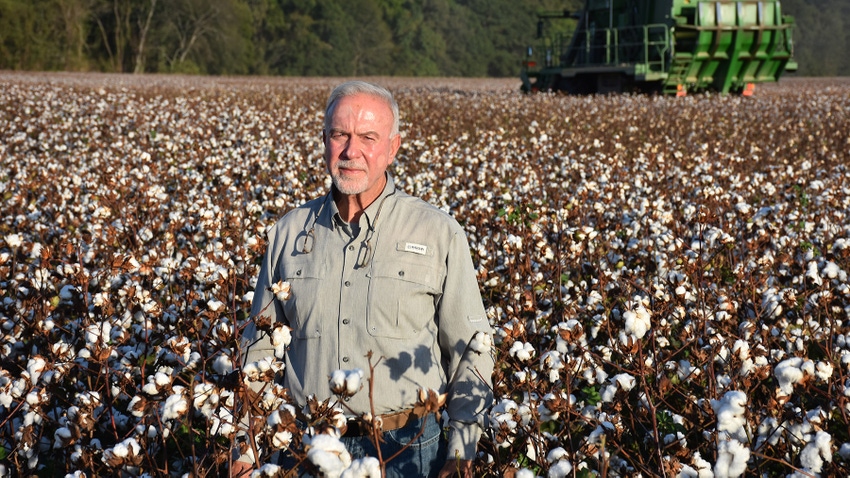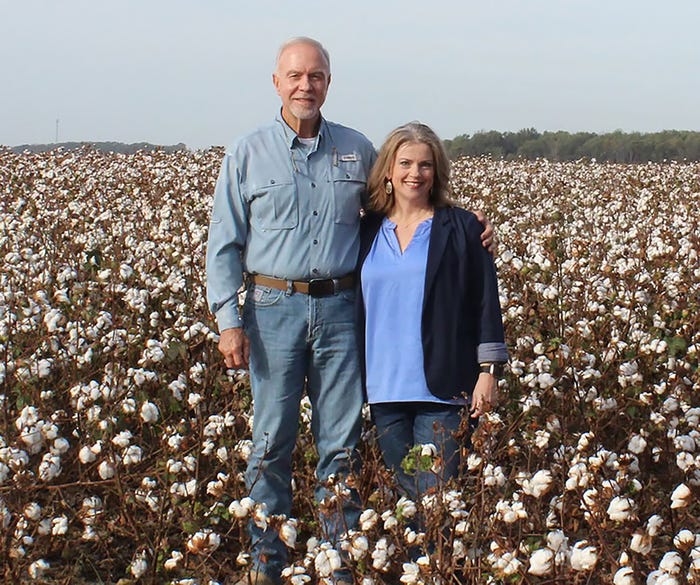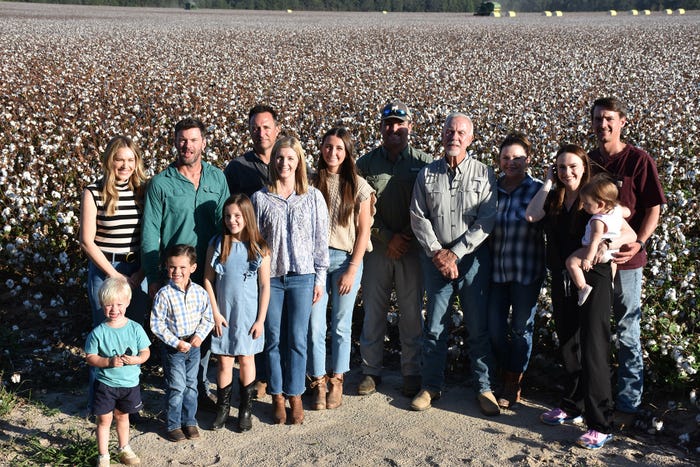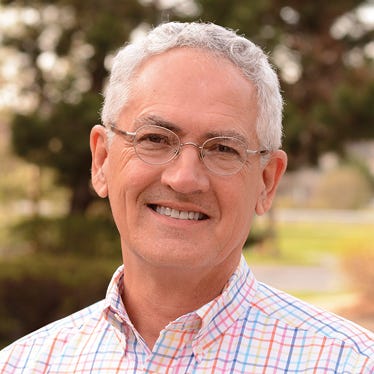
If you can tell the character of a person by the company they keep, then the 2024 High Cotton Award winner from the Delta region, Louisiana farmer Edward Greer, is in good standing.
When Farm Press visited Greer on a portion of his farming operation outside of Start, La., no fewer than 15 family members and friends joined him on the tail-end of a field for the visit.
Granted, he had been told to include anyone he wanted to join him, but most everyone showed up. At one point a wave of guilt rose through the crowd as they realized one person failed to get the notification.
It was an otherwise enthusiastic gathering of family and a couple of friends that embraced the head of the family as he spoke about his operation and how he has managed a myriad of farm-related businesses and community organizations. It was also quite evident that within the group, Greer is well respected and loved.
“This is kind of my support,” Greer said, as family gathered, grandkids stomped in the dust and impromptu conversations about football, school events and the location of the missing individual popped up.
Farming enterprise
Greer farms about 8,500 acres in and around Rayville and Start, La. While his principal crop is cotton, he also raises rice, soybeans, wheat and corn. He also has a few other irons in the fire.
He is president of Rayville Producers Cotton Gin; serves on the board of Richland Parish Chamber of Commerce; Staplcotn Advisory Board, Foundation Board NOTBS; and serves as deacon at First Baptist Church, Rayville. He is a Crop Advisor for Simplot Grower Solutions in north Louisiana and southeast Arkansas, as well.
Greer and his wife, Gail, actively farm with their son Brooks Greer and his wife, Racheé; and his daughter, Crystal, and her husband Mike Barras. Crystal is the principal bookkeeper and record keeper for Greer Farms Partnership.

Edward Greer and daughter, Toni. (Brent Murphree)
The farm enterprise also includes a land leveling entity, and a custom harvesting and field work operation.
“My great-grandfather settled in the area in the 1800s,” Greer said. “And, we haven’t gone anywhere.
“I still remember, as a kid, riding in a school bus with my dad to a nearby town to pick up people to pick cotton by hand. I remember being in a trailer helping to dump the sacks when I was six or so years old.”
He also recalls having Christmas dinner on a turnrow in a cotton field. They were still picking cotton. Sometimes they would pick cotton until January or February, having to wait until the ground froze to run the pickers.
Getting started
Greer worked on the farm established by his grandfather, dad and uncles while attending school. While attending Northeast Louisiana University in Monroe, Greer began working for Richland Farmers Coop in Rayville. Over the years, the Farmers Co-op became Richland Farm Supply, Sanders, Pinnacle Ag and now Simplot Grower Solutions.

Edward Greer (tan shirt), and family member in cotton field south of Start, La. (Brent Murphree)
He began farming on his own about 43 years ago while continuing to manage the farm supply business.
His late father, Frank Greer, and Frank’s brothers were good examples as stewards of their land and were pioneers of irrigation in the area, according to family friend and crop consultant, Ashley Peters.
“Edward has worked diligently to constantly improve the operation and make it more sustainable and environmentally sound,” Peters said. “Whether he is talking about the newest improvements he has made to his planting practices or harvesting equipment, or the gin upgrades where he serves on the board and gins his cotton, one can tell he truly delights in talking all things cotton.”
Reliable water
On the irrigation front, Greer noted that Richland Parish has a good reliable water supply, and he uses that resource when rain doesn’t come when needed.
“We have the resources to make crops, and then we have to tap into the stuff,” he said. “It takes a lot of money and time to get it all done.”
But when the supply is in place it works to an advantage.
“When I first started irrigating cotton, when I was a young fellow, we had flume ditches and we watered it with syphon pipe,” he said. “We'd water a few rows at a time.”
He eventually moved to poly pipe.
“I think we have 104 irrigation wells,” Greer said. “And we lay about 150 miles of poly pipe on the entire farm, so it's a major operation.”
It came in handy in 2023 when temperatures hit record highs with an extended period of no rain.
“We had an extremely dry and hot summer here,” he said. “We had 40-some days of a hundred degree-plus temperatures and no rain. I think we went 45 days or so without rain.”
There was some heat stress this year, according to Greer, as a spat of small bolls appeared near the top of the crop in some areas where the crop may not have had adequate water.
“Brooks was on a picker the other day as we were custom harvesting and told me that the cotton right by the poly pipe was very good cotton, beautiful,” he said. “But before you got too far from the pipe, it was just knots. Not much there.”
The problem is trying to get the right amount of water to the right place to counter the ill effects of drought and heat.
“You can leave the pump on too long in cotton,” he said. “So, you have got to figure the right hole size to punch to get the water to the end. It gets challenging.”
Desired results
They have looked at some of the programs that estimate the size for holes to punch in poly pipe to get the desired results, but Greer says that they have worked with the plastic pipe long enough that Brooks knows how the water runs, what size of pipe to use and what size holes to punch. He has a journal that helps him keep the system straight.
It does add up to a lot of poly pipe, which they recycle through Delta Plastic’s Revolution poly pipe recycling program.
Keeping everything straight in an operation that farms 8,500 acres can be cumbersome, but Greer said that all the inputs are filtered through his daughter, Crystal, in the office.
She tends to the labor paperwork and needs, tracking fertilizer and crop protection uses, as well as yield data.
“She takes care of all of it,” he said. “I can call Crystal at any time and say, I need to see what we've done on a particular farm. Within five minutes she can email me a spreadsheet showing everything, every dollar.”
He said that when he first started, he tracked everything but grew to learn that it was best to let someone else do the things he was not able to do. They use OptiGro from Simplot to manage their data and My John Deere to gather their data from the equipment in the field.
With the data they can track each piece of equipment and tell exactly how much it costs to run each operation. The yield monitors can trace where the crop needs help and where to place extra needed nutrients precisely in the field.
Cotton varieties
He normally participates in variety trials but did not do any tests in 2023. That doesn’t mean he doesn’t know which varieties have done well for him.
“We plant everybody’s cotton. I've got five or six different varieties planted,” he said. “So, my trials are big acre trials. I track everything and we use that. Last year, we had eight different cotton varieties.”
In 2023 he planted PhytoGen, Delta Pine, Stoneville and NexGen varieties.
He markets his cotton through Staplcotn, which is onboard with the U.S. Cotton Trust Protocol.
“Its main goal is to make people aware that U.S. cotton has been grown by good standards,” he said. “It increases the demand for U.S. cotton.”
Brands and retailers are more likely to buy cotton that is grown in a responsible way. With the time and effort that the Greer family put into managing their crop well, with Edward at the helm, the operation is well tuned to the sustainability message and the need to carry on the enterprise as later generations arise and work onto the farm.
And it doesn’t just stay on his family operation. He has consulted, advised and partnered with many growers, as well.
Family friend, Chip Hixon, said, “If you are looking for someone to be a cotton steward, Edward Greer is your man.”
The High Cotton award is sponsored by: Americot, BASF Stonevilee/FiberMax, Deltapine, Dyna-Gro, Helena, John Deere, PhytoGen, Syngenta
Read more about:
High CottonAbout the Author(s)
You May Also Like






